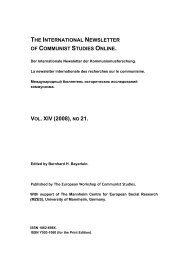11RXNdQ
11RXNdQ
11RXNdQ
Create successful ePaper yourself
Turn your PDF publications into a flip-book with our unique Google optimized e-Paper software.
Colonialism and Neocolonialism 42<br />
conference on the Monday, it seemed like it was all over: he would be gentle, benign,<br />
loyalist, and the people would be won over. On the Monday morning, at about midday,<br />
they were gambling on a losing Republic.<br />
After the press conference, the Republic was still standing; our institutions seemed<br />
more solid than we had thought. There were still threats: the Republic might not hold out<br />
against violence. But it was already quite something that it had not given in to the gentle<br />
approach.<br />
The scenario was set up, as we have just seen: some reassurances would be offered to<br />
public opinion which, in its enthusiasm, would oblige Monsieur Pflimlin to resign. To<br />
everyone’s surprise, the opposite happened: the General’s friends pulled sour faces; the<br />
only faces that lit up were those of his resolute opponents. And yet, he had made some<br />
very reassuring declarations, the sincerity of which cannot be doubted: he did not wish or<br />
deign to be seditious, even less a dictator; he would receive his powers from the President<br />
of the Republic and – however exceptional the adopted procedure may be – his<br />
investiture from the Assembly.<br />
But, already, what General de Gaulle thought or said was of importance only to<br />
himself and those close to him: when he stated, in all good faith, that he did not have any<br />
intention, at the age of 67, of running a dictatorship, he was left with only this alternative:<br />
renounce power (or not be called upon to take it) or become a dictator. For the situation<br />
decides. Not about our personal actions, but the meaning that they assume, in spite of<br />
ourselves, for other people and in our own eyes.<br />
We must first of all talk about that lame fiction: arbitration. To avoid asking the<br />
fundamental question (‘On what will the sovereign authority of General de Gaulle be<br />
based?’), Monsieur Soustelle had invented this juridical ruse: between the French of<br />
Algeria (civilian and military) and the Government there is a dispute. Charles de Gaulle<br />
is asked if he would be kind enough to arbitrate in this dispute.<br />
But as soon as it is mentioned, this strange argument, which the General took up again<br />
at his press conference, does not sound right, it is awkward. Where has a government,<br />
however weak, been seen to agree to resolving by arbitration a conflict caused by the<br />
rebellion of its public officials? De Gaulle wished to make it clear that Generals Salan<br />
and Massu were not seditious; the Government, he added, does not consider them as<br />
such. That is true officially, but the Government is not sure of itself; it may be stalling. It<br />
is of little importance in any case: these Generals are either seditious or they are not.<br />
In the first case, the Government takes disciplinary measures even if its temporary<br />
weakness obliges it not to apply them; to propose arbitration is to reward revolt. In the<br />
second case, they have not ceased to obey their superiors (even if the state of emergency<br />
has forced them to take such and such a measure without consultation) and there is<br />
nothing to arbitrate. As we can see, no sooner is this incredible proposal formulated than<br />
it becomes an affront to the sovereign authority of the State and has no legality.<br />
Yet attempts are made to define it: it falls to pieces at once. The conflict is between<br />
‘French Algeria’ and the government. What does the arbitrator do? He wants to remove<br />
one of the parties in the dispute and take his place. And indeed, it is in order to arbitrate<br />
that General de Gaulle will assume the role and powers of Monsieur Pflimlin. But when<br />
Monsieur Pflimlin becomes Charles de Gaulle, how can arbitration still be possible? First<br />
of all, the arbitrator is both judge and party; and then there is nothing to arbitrate because




